Select Language
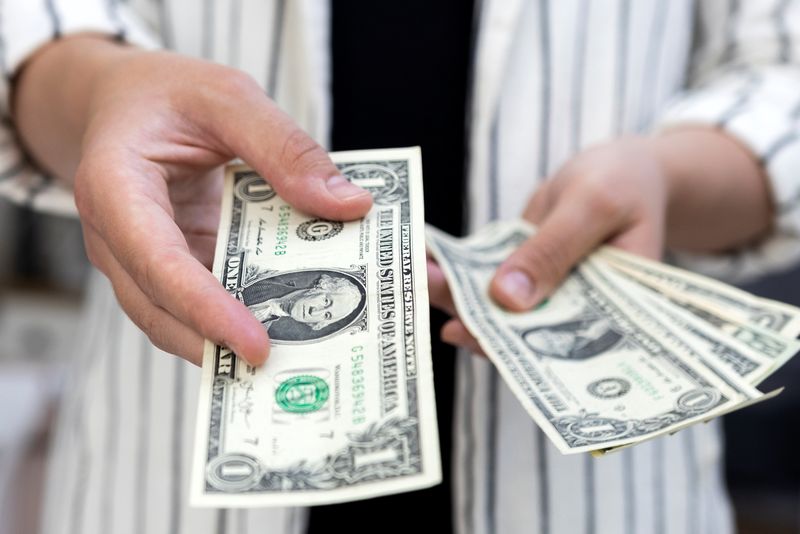
By Kevin Buckland
TOKYO (Reuters) -The dollar hovered close to an eight-week low on Friday ahead of a crucial U.S. jobs report that could provide clues on the timing of Federal Reserve interest rate cuts.
The euro held on to overnight gains after the European Central Bank reduced rates in a well-telegraphed move, but offered few hints about future easing as lingering inflation clouds the outlook.
The U.S. dollar index, which tracks the currency against the euro and five other major rivals, was little changed at 104.09 as of 0453 GMT, not far from this week's low of 103.99, the first time it had broken below 104 since April 9.
For the week, the index was on track for a 0.54% slide following a run of weaker macro data that put prompted investors to put two, quarter-point Fed rate cuts back on the table for this year.
That has seen traders positioned for a softer non-farm payrolls report later in the day, with the possibility that jobs growth comes in below the 185,000 median forecast of economists.
The Federal Open Market Committee is not expected to make any change at its policy meeting next week, but markets currently price in 50 basis points of cuts by end-December, with the first cut most likely coming in September.
"We expect the overall message from the non‑farm payrolls report to be one of strength, albeit ebbing," Joseph Capurso, head of international economics at Commonwealth Bank of Australia (OTC:CMWAY), wrote in a client note.
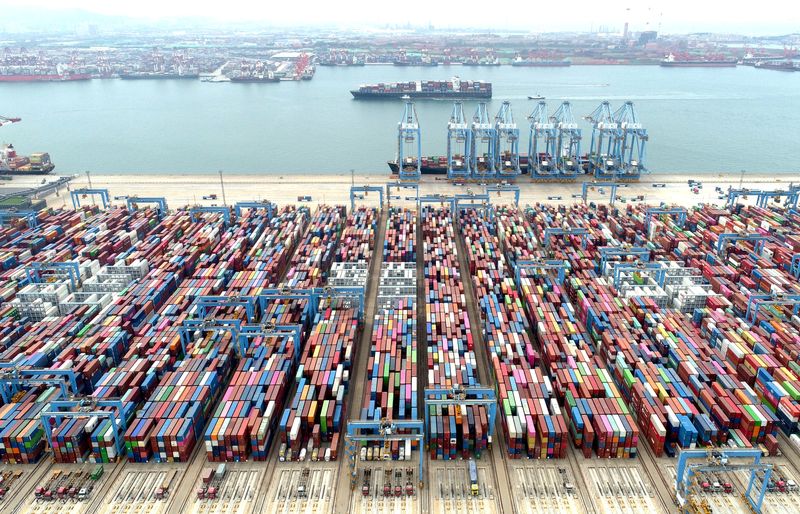
BEIJING (Reuters) - China's trade surplus with the United States was $30.8 billion in May, customs data showed on Friday, widening from the $27.24 billion surplus in April.
The trade surplus with the United States stood at $128.2 billion for January-May.
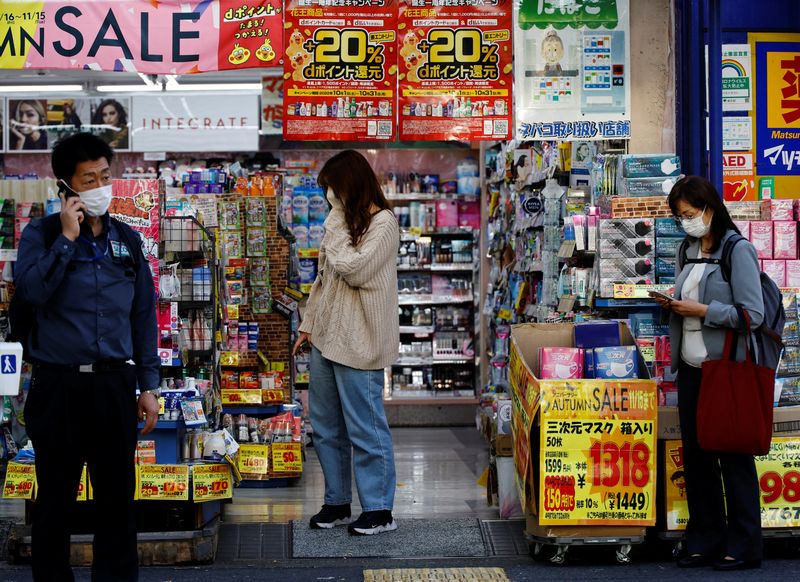
By Satoshi Sugiyama
TOKYO (Reuters) -Japanese household spending rose for the first time in 14 months in April from the year earlier, data showed on Friday, although the tepid growth showed consumers remained reluctant to loosen their purse-strings in the face of higher prices.
Consumer spending rose 0.5% in April from a year earlier, data from the internal affairs ministry showed. That was slightly below the median market forecast for a 0.6% uptick.
On a seasonally adjusted, month-on-month basis, spending fell 1.2%, versus an estimated 0.2% rise.
"Personal consumption, which has been stagnant for a long time, continues to be weak," said Masato Koike, economist at Sompo Institute Plus. "High prices are weighing on household consumption."
Sluggish private consumption is a source of concern for policymakers striving to achieve sustained economic growth underpinned by solid wages and durable inflation, which are prerequisites for normalising monetary policy.
While spending on education and clothing and footwear increased in April, expenditures in food, entertainment and utilities decreased, the government data showed.
The consumption data comes a day after a Bank of Japan board member Toyoaki Nakamura, one of the more dovish members, said domestic consumption has been sluggish recently, expressing concern that inflation may fall short of the central bank's 2% target from fiscal 2025 onwards if such conditions persist.
Separate data released on Wednesday showed Japan's regular pay in April rose at the fastest pace in nearly three decades but that inflation-adjusted wages remained weak, extending a record streak of 25 consecutive months of decline.
Going forward, consumption is expected to gradually improve as wages hikes from this spring's labour talks materialise, inflation slows down and temporary cuts in resident and income tax boost consumption, Koike at Sompo Institute Plus said.
"If consumption continues to be weak, it will be difficult to normalise the monetary policy, but real wages are expected to recover and consumption is believed to pick up, which will give (the BOJ) momentum for policy normalisation," Koike said.
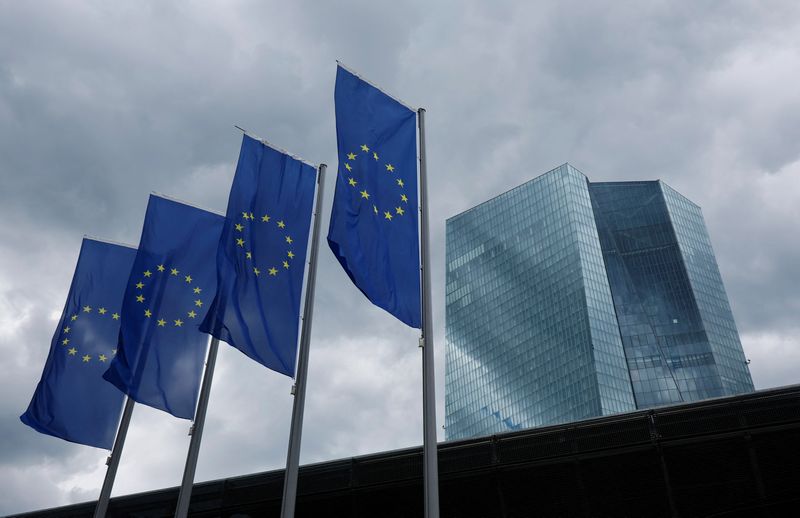
FRANKFURT (Reuters) - The European Central Bank cut interest rates for the first time in five years on Thursday but kept investors in the dark about its next move given increasing uncertainty over inflation after a sharp slowdown in the past year.
The ECB lowered its record-high deposit rate by 25 basis points to 3.75%, joining the central banks of Canada, Sweden and Switzerland in starting to unwind some of the steepest rate hikes used to tame a post-pandemic inflation surge.
Thursday's well-flagged move is seen as the start of an easing cycle, but lingering price and wage pressures are clouding the outlook and may force the euro zone's central bank to wait months before cutting again.
"The Governing Council will continue to follow a data-dependent and meeting-by-meeting approach to determining the appropriate level and duration of restriction," the ECB said in a statement.
While the ECB kept open its options for July, a string of influential policymakers, including board member Isabel Schnabel and Dutch central bank chief Klaas Knot have already made the case for a pause next month, suggesting the next window of opportunity for easing will be in September.
Economists see another two rate cuts from the ECB this year, most likely in September and December, while markets are pricing in between one and two more moves - a big change from the start of the year, when more than five cuts were anticipated.
"Interest rate decisions will be based on its assessment of the inflation outlook in light of the incoming economic and financial data, the dynamics of underlying inflation and the strength of monetary policy transmission," the ECB added. "The Governing Council is not pre-committing to a particular rate path."
Conservative policymakers, who still appear to command a majority on the rate-setting Governing Council, have argued that the ECB is not in any hurry to cut since a rebound in the economy proves high rates are not choking off growth.
Part of their caution may be due to unexpectedly stubborn inflation. Indeed, the ECB raised its 2025 inflation projection to 2.2% on Thursday from 2.0%.
"Despite the progress over recent quarters, domestic price pressures remain strong as wage growth is elevated, and inflation is likely to stay above target well into next year," the ECB said.
Some economists say the biggest risk to the rate cut schedule is actually the U.S. Federal Reserve, not wages and inflation.
The Fed has clearly signalled a delay in policy easing and a further delay in U.S. rate cuts is likely to make the ECB more cautious too, as a widening interest rate differential would weaken the euro and raise imported inflation.
Attention now turns to ECB President Christine Lagarde's press conference, where she is likely to be grilled about the ECB's likely next moves.
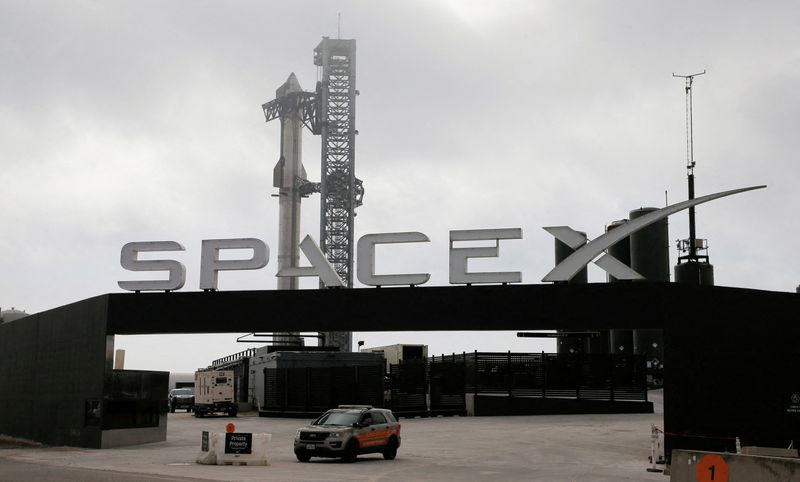
By Joey Roulette
WASHINGTON (Reuters) - The U.S. Federal Aviation Administration (FAA) on Tuesday said it issued a license for SpaceX's fourth flight of its Starship rocket system, another test mission along the company's path to building a reusable satellite launcher and moon lander.
SpaceX, owned by Elon Musk, is aiming to launch its nearly 400-foot-tall (122-meter), two-stage Starship as early as Thursday at 7 a.m. CDT (1200 GMT) from its rocket facilities in south Texas, from which past flights in the company's test-to-failure development campaign have launched.
Starship represents the future of SpaceX's dominant satellite launch and astronaut business. It is designed to be fully reusable and cheaper - but more powerful - than the company's workhorse Falcon 9. NASA plans to use Starship later this decade to land the first crew of astronauts on the moon since 1972.
Each Starship rocket has made it farther in its testing objectives than previous tests before blowing up. The first launch in April 2023 exploded minutes after liftoff, and the most recent flight in March broke apart in Earth's atmosphere as it attempted to return from space halfway around the globe.
On Thursday, the rocket system's first stage, called Super Heavy, will ignite its 33 Raptor engines to lift off, then separate from the Starship second stage, which will blast further into space.
Meanwhile, Super Heavy will reignite some engines and return toward the Gulf of Mexico for a "soft splash-down" to simulate a landing that would otherwise be on land.
In space, Starship will trek around the globe and head for the Indian Ocean, where it will make a second attempt to survive the intense heat of atmospheric reentry - the crucial point at which it failed during the March test.
"The main goal of this mission is to get much deeper into the atmosphere during reentry, ideally through max heating," Musk, CEO of SpaceX, wrote on X on Saturday.
Starship is shielded with hundreds of small black tiles on its exterior that SpaceX hopes will protect it from the extreme heat the spacecraft endures while plunging through Earth's atmosphere at hypersonic speeds.
Much is riding on SpaceX's swift development of Starship, a key pillar of NASA's moon program that rivals China's moon ambitions.
Musk's drive to rapidly build Starship has endangered SpaceX workers in Texas and California, a Reuters investigation earlier this year found.

By Anant Chandak
BENGALURU (Reuters) - Growth in India's services activity growth slowed to a five-month low in May as robust domestic demand weakened, according to a survey, which also showed exports growing at a record pace and job creation rising to a 21-month high.
The final HSBC India Services purchasing managers' index, compiled by S&P Global, fell to 60.2 last month from April's 60.8, confounding a preliminary reading for a rise to 61.4.
However, it remained above the 50 mark separating growth from contraction for the 34th straight month.
"India's service activity rose at a slightly softer pace in May, with domestic new orders easing slightly, but remaining robust, implying strong demand conditions and successful advertising," noted Maitreyi Das, global economist at HSBC.
Even though the new business sub-index - a key gauge for demand - remained robust in May, it grew at the slowest pace this year due to fierce competition and heat waves across the country hampering livelihood.
However, exports expanded at the steepest pace since the inclusion of the sub-index in the monthly survey nearly a decade ago.
With signs of recovery in China and economic activity remaining resilient in the U.S., the recent pick up in global demand could continue.
Strong sales led the business outlook for the coming 12 months to climb to an eight-month high, encouraging services firms to add jobs at the fastest pace since August 2022.
But price pressures intensified last month from April with input prices outpacing its long-run average and prices charged also quickening slightly.
"Cost pressures ticked up in May led by higher raw material and labour costs. Firms were only able to transfer a part of the price rise to customers," added Das.
That could trigger a resurge in inflation, which has largely eased this year, raising chances the Reserve Bank of India would keep interest rates on hold for a longer period and likely cut in October-December quarter compared with July-September expected earlier.
As business activity in both manufacturing and services eased slightly in May, it meant the overall HSBC India composite PMI output index fell to a five-month low of 60.5 last month from April's 61.5 and below a flash estimate of 61.7.
Sustained growth in both services and factory activity would be key focus areas for the new government elected on June 4 to ensure India continues to hold on to its title as the fastest-growing major economy in the years ahead.
India grew at a better-than-expected pace of 7.8% last quarter.
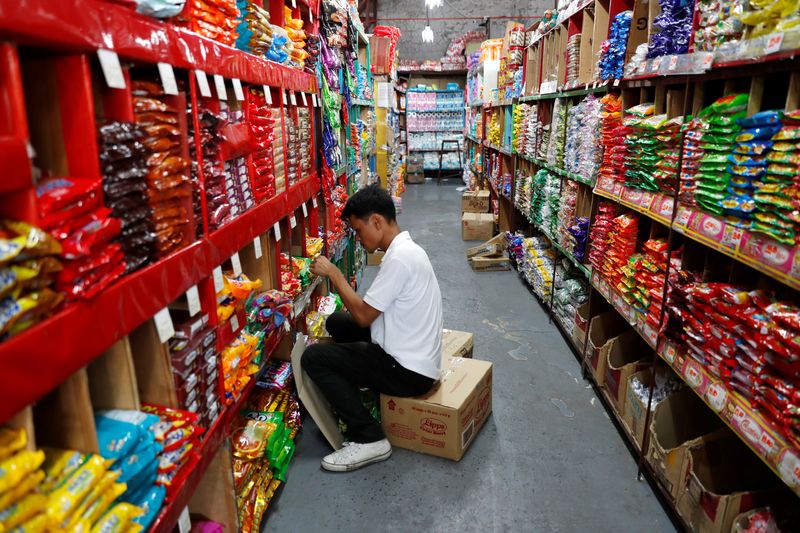
By Neil Jerome Morales and Mikhail Flores
MANILA (Reuters) -Philippine annual inflation quickened for a fourth straight month in May due largely to the faster pace of increases in housing, utility and transport costs, the statistics agency said on Wednesday.
The consumer price index rose 3.9% in May from 3.8% the previous month, marking the fastest rise since November 2023, bringing the five-month average inflation to 3.5%, well inside the central bank's 2.0%-4.0% target for the year.
Economists in a Reuters poll had forecast annual inflation at 4.0%.
The Bangko Sentral ng Pilipinas (BSP) said last month's data was consistent with its expectations that inflation could accelerate over the near term due to the impact of adverse weather conditions on farm output.
Core inflation, which strips out volatile food and energy prices, eased to 3.1% in May from 3.2% the prior month.
BSP Governor Eli Remolona reiterated on Tuesday the benchmark policy rate, currently at a 17-year high of 6.50%, could be cut before the U.S. Federal Reserve starts it easing cycle.
But Ruben Carlo Asuncion, chief economist at Manila-based Union Bank, believed the BSP would still prefer to wait for the Fed to move before it does to prevent the peso, down more than 5% against the dollar so far this year, from weakening too much.
"They may have to prioritize interest rate differentials over the speed of cuts," Asuncion said in a phone message.
The Philippine central bank, which kept its benchmark rate steady at its last five meetings, has said it was looking to cut rates by 25 basis points as early as August and by another 25 basis points in the fourth quarter.
Its next meeting is on June 27.
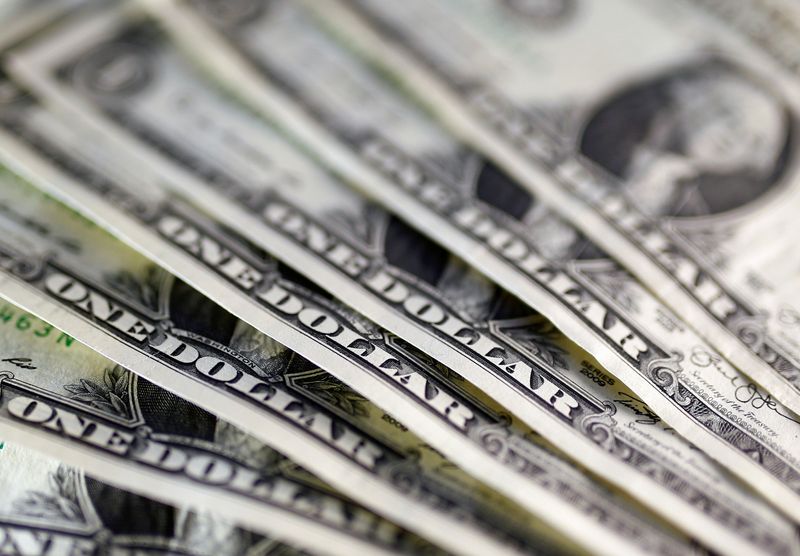
By Vivek Mishra and Vuyani Ndaba
BENGALURU/JOHANNESBURG (Reuters) - REUTERS POLL-NO REBOUND SEEN FOR EMERGING MARKETS CURRENCIES AS INVESTORS PONDER ELECTIONS, SCOPE FOR US EASING
REUTERS POLL-EMERGING MARKETS CURRENCIES FORECAST TO EITHER WEAKEN OR CLING TO RANGES IN 3 TO 6 MONTHS
Emerging market currencies will struggle to rebound this year, pressured by a U.S. Federal Reserve that is in no rush to cut interest rates and some pivotal national election results, according to a Reuters poll of currency analysts.
Limited by a strong dollar this year, nearly all emerging markets currencies were forecast to weaken, or at best trade in a range in the next three to six months, according to the May 31 - June 4 survey of over 50 foreign exchange strategists.
Emerging markets assets have gained slightly after weak U.S. data suggested the Fed might start cutting interest rates as soon as September, which could ease the pressure from the dollar. This global theme remains pivotal to emerging markets amid a host of key elections.
U.S. policymakers, however, remain tight-lipped about the exact timing of policy easing and a bull run for emerging markets currencies it might trigger is not on the horizon.
"Most EM currencies have stabilized in the past month, but we think many will remain under pressure until U.S. yields drop," said Ruben Gargallo Abargues, assistant economist at Capital Economics.
"We continue to think the dollar will be on the front foot for some months until inflationary pressures ease and the Fed pivots towards rate cuts."
Recent days brought elections in India, South Africa, and Mexico and emerging markets are expected to stay volatile in the near-term as investors parse out what these results mean for future economic reforms.
The Indian rupee, Korean won and the South African rand are seen trading in a tight range in the next three to six months, while the Russian rouble and Turkey's lira were forecast to soften over 5%.
Mexico witnessed Claudia Sheinbaum's historic ascent as the nation's first female president, while South Africa's African National Congress suffered its toughest electoral setback in 30 years.
The Mexican peso closed on Tuesday at its weakest to the dollar since November after the country's ruling party looked poised for a super-majority in Congress that markets fear might bring constitutional change and diminish checks and balances.
Barclays analyst Erick Martinez, however, expected the impact to be short-lived.
"Ultimately, the dust will settle, markets will crunch numbers and determine what's feasible and what's not, and would go back to trading global factors especially given the strong links between the Mexican and U.S. economy," he said in a note.
In South Africa, investors wait to find out which from the wide array of parties - from Marxists to proponents of free markets - the ANC may pick as potential coalition partners.
For other stories from the June Reuters foreign exchange poll click here
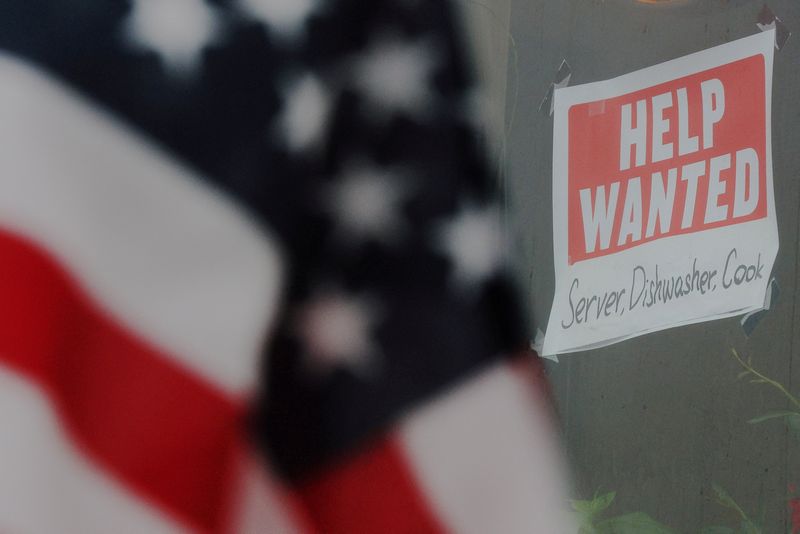
By Howard Schneider
WASHINGTON (Reuters) - The U.S. job market in April cleared a key hurdle in its slow return from the COVID-19 pandemic when a wonky economic chart known as the "Beveridge Curve" finished its own journey from where it had shifted during the health crisis back to where it was in 2018 to 2019.
The Beveridge Curve plots the relationship between job openings and the unemployment rate, and data released on Tuesday further validates an idea floated by Federal Reserve Governor Christopher Waller in mid-2022 that, counter to the idea that inflation could only fall with a large rise in the unemployment rate, the pandemic's elevated level of job openings pointed to an alternate path.
A drop in job openings could create the economic "slack" needed for inflation to fall without much change in actual joblessness - returning the Beveridge Curve to where it was.
As of April, that appears to be what has happened.
The story isn't completely written: Inflation, which was running at 2.7% in April based on the Fed's preferred measure, is not back to the U.S. central bank's 2% target, and recent progress has been sluggish.
But measures of what's happening in the labor market are looking increasingly like they did before the pandemic.
NOT A MARQUEE CONCEPT
The Beveridge Curve is not one of the marquee economic concepts beyond the community of labor experts, but it has had a moment during the pandemic, with a large shift at the start of the health crisis and now a round trip back. Still unresolved is whether further progress on inflation - the so-called "last mile" - will require a move along the normal part of the curve, with further declines in job openings associated with rising unemployment.
JOB OPENINGS TO UNEMPLOYED
As the economy reopened from the pandemic, firms scrambled to meet a wave of demand. Job openings spiked. The ongoing health crisis, however, put a damper on the willingness to work, crimping labor supply.
By the spring of 2022 the Bureau of Labor Statistics estimated there were more than two open jobs for each unemployed person. The number before the pandemic never went much beyond 1.24.
In April it had returned to 1.24, a steady realignment between the demand for workers and those available to fill jobs.
QUITS RATE
From "ghosted" employers to a wave of retirements, the pandemic was a moment of peak leverage for people who wanted to negotiate new terms, a new job or better pay, or simply not show up. The quits rate told the tale, with nearly 3% of the workforce leaving jobs every month from mid-2021 to mid-2022 - a historic reshuffling of the labor market.
Much to the relief of human resource officers as well as Fed policymakers, it has been at 2.2% for six straight months, below where it was before the pandemic.
UNEMPLOYMENT RATE
An unemployment rate of around 4% is what the U.S. can support without rising inflation, according to Fed economic projections. But in mid-2018 the jobless rate dipped below that level and, as the spike in unemployment caused by the pandemic receded, resumed the same trend in early 2022. Whether that represents a "new" normal of high comparative demand for labor remains to be seen; job markets may just be functioning better through, for example, technology that improves matching and allows for faster hiring.
Regardless, it's another way today's job market looks like it did before the coronavirus outbreak.
MONTHLY PAYROLL GROWTH
The release on Friday of the U.S. government's monthly jobs report will provide the latest look at a key aspect of labor normalization when employment and job growth data for May are released.
Even if the U.S. population is growing slowly, it is still growing, so more jobs are needed each month to keep pace. Exactly how many more is a matter of debate. There are estimates of fewer than 100,000, though lately a jump in immigration has led to speculation that the number could be double that figure.
The job growth seen during the post-pandemic reopening of the economy, however, is widely considered unsustainable. It has been slowing, with a pace gradually coming into line with the average of 183,000 per month seen in the decade before the health crisis.
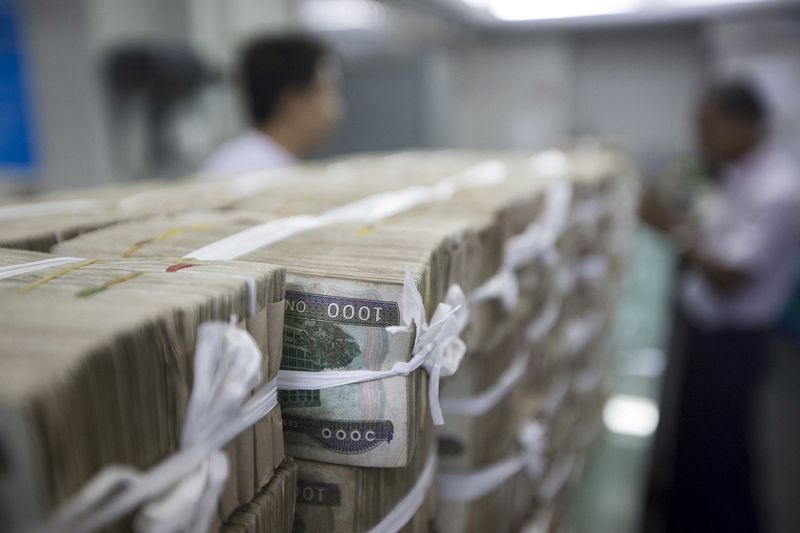
(Reuters) - Myanmar's junta is cracking down on gold and foreign exchange traders and agents selling foreign real estate, with 35 arrests announced in the last two days as part of efforts to stabilise its rapidly depreciating currency.
State media said these include five people charged with illegally selling condominium units in Thailand and 14 people arrested for allegedly destabilising the foreign currency exchange rate.
The kyat currency hit a record low last week, plummeting to around 4,500 per dollar on the black market, according to five foreign exchange traders.
Black market rates for the kyat have for years been significantly higher than the reference rate of Myanmar's central bank, currently set at 2,100 kyat per dollar.
"The government is working towards the stability of the country and the rule of law," the Global New Light of Myanmar newspaper said on Tuesday, carrying photographs of over a dozen suspects.
"Security organisations have taken action against business people engaged in speculation to hinder the country's economic development," it said.
Another 21 people have been arrested for allegedly destabilising gold prices, the newspaper reported on Monday.
The impoverished Southeast Asian country of about 55 million people has been in political and economic turmoil since a 2021 coup when the military ousted an elected civilian government after a decade of tentative democracy and economic reform.
Myanmar's economy, already fragile after decades of military rule and the pandemic, has wilted since the coup, with foreign investment drying up, exacerbated by western sanctions.
Poverty rates have almost doubled from 24.8 percent in 2017 to 49.7 percent in 2023, according to the United Nations Development Programme.
The shadow National Unity Government (NUG), comprising former lawmakers and other junta opponents, said the military government has printed large volumes of currency since taking power and ramped up military spending, exacerbating the country's economic problems.
A junta spokesman did not respond to a call from Reuters seeking comment.
"We understand that they are continuing to print kyat," NUG finance minister Tin Tun Naing said at an online press conference on Monday.

